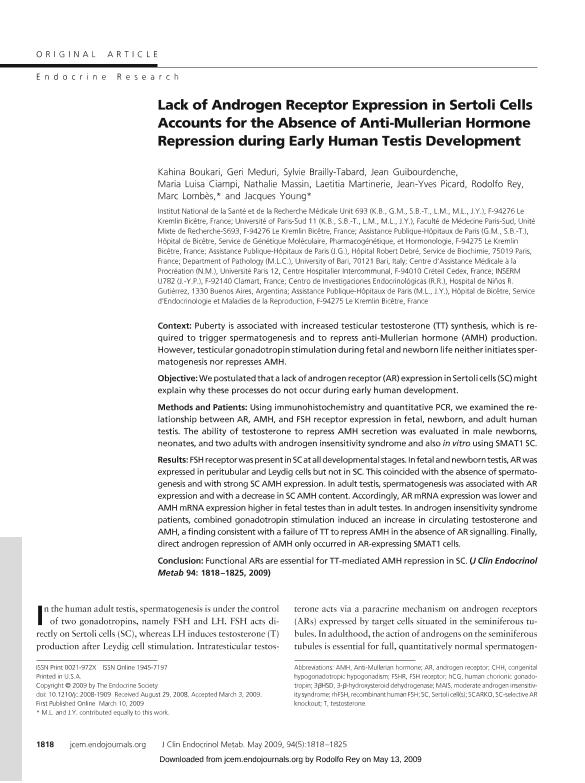Artículo
Lack of androgen receptor expression in Sertoli Cells accounts for the absence of Anti-Müllerian Hormone repression during early human testis development.
Boukari, Kahina; Meduri, Geri; Brailly Tabard, Sylvie; Guibourdenche, Jean; Ciampi, Maria Luisa; Massin, Nathalie; Martinerie, Laetitia; Picard, Jean Yves; Rey, Rodolfo Alberto ; Lombès, Marc; Young, Jacques
; Lombès, Marc; Young, Jacques
 ; Lombès, Marc; Young, Jacques
; Lombès, Marc; Young, Jacques
Fecha de publicación:
12/2009
Editorial:
Endocrine Society
Revista:
Journal of Clinical Endocrinology and Metabolism
ISSN:
0021-972X
Idioma:
Inglés
Tipo de recurso:
Artículo publicado
Clasificación temática:
Resumen
Context: Puberty is associated with increased testicular testosterone (TT) synthesis, which is required to trigger spermatogenesis and to repress anti-Mullerian hormone (AMH) production. However, testicular gonadotropin stimulation during fetal and newborn life neither initiates spermatogenesis nor represses AMH. Objective: We postulated that a lack of androgen receptor (AR) expression in Sertoli cells (SC) might explain why these processes do not occur during early human development. Methods and Patients: Using immunohistochemistry and quantitative PCR, we examined the relationship between AR, AMH, and FSH receptor expression in fetal, newborn, and adult human testis. The ability of testosterone to repress AMH secretion was evaluated in male newborns, neonates, and two adults with androgen insensitivity syndrome and also in vitro using SMAT1 SC. Results: FSH receptor was present in SC at all developmental stages. In fetal and newborn testis, AR was expressed in peritubular and Leydig cells but not in SC. This coincided with the absence of spermatogenesis and with strong SC AMH expression. In adult testis, spermatogenesis was associated with AR expression and with a decrease in SC AMH content. Accordingly, AR mRNA expression was lower and AMH mRNA expression higher in fetal testes than in adult testes. In androgen insensitivity syndrome patients, combined gonadotropin stimulation induced an increase in circulating testosterone and AMH, a finding consistent with a failure of TT to repress AMH in the absence of AR signalling. Finally, direct androgen repression of AMH only occurred in AR-expressing SMAT1 cells. Conclusion: Functional ARs are essential for TT-mediated AMH repression in SC.
Palabras clave:
AMH
Archivos asociados
Licencia
Identificadores
Colecciones
Articulos(CEDIE)
Articulos de CENTRO DE INVESTIGACIONES ENDOCRINOLOGICAS "DR. CESAR BERGADA"
Articulos de CENTRO DE INVESTIGACIONES ENDOCRINOLOGICAS "DR. CESAR BERGADA"
Citación
Boukari, Kahina; Meduri, Geri; Brailly Tabard, Sylvie; Guibourdenche, Jean; Ciampi, Maria Luisa; et al.; Lack of androgen receptor expression in Sertoli Cells accounts for the absence of Anti-Müllerian Hormone repression during early human testis development.; Endocrine Society; Journal of Clinical Endocrinology and Metabolism; 94; 5; 12-2009; 1818-1825
Compartir
Altmétricas



